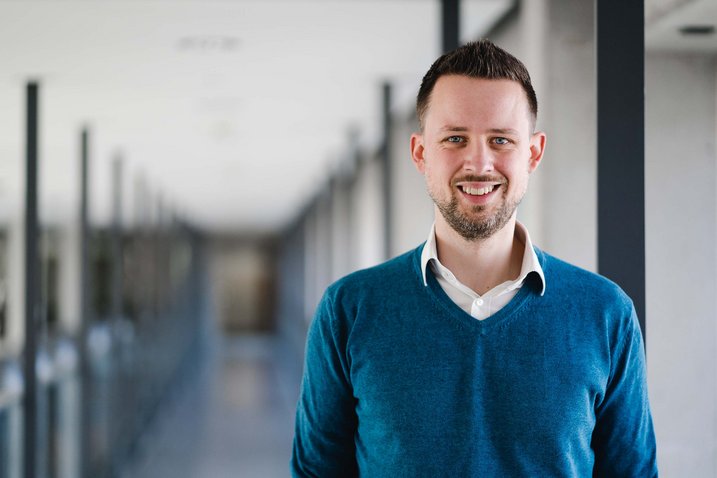With a total of almost 100 in-person and online attendees from academia, business, and politics, the University Alliance for SMEs (HAfM) had the opportunity to discuss social responsibility and innovation at universities of applied sciences at its 7th Berlin Transfer Conference last week. Whether it’s a shortage of skilled workers, the nursing care crisis, or ensuring the provision of public services in rural areas – challenges such as these facing society as a whole must be resolved locally. Together with small and medium-sized enterprises (SMEs), the universities of applied sciences are developing customized solutions for their regions.
“The Transfer Conference showed that the topic of social innovations has found its way into the awareness of those involved, but to sustainably anchor it locally, we need a new culture of innovation,” saied Prof. Dr.-Ing. Kira Kastell, Chairwoman of the Board of HAfM and President of Hamm-Lippstadt University of Applied Sciences. There were positive signals for this from the BMBF, which was also represented at the transfer conference by Zarah Bruhn, Commissioner for Social Innovation, and Dr. Gisela Philipsenburg, responsible for innovation and transfer policy at the Ministry. Ms. Bruhn particularly emphasized the need for a joint approach by the various stakeholders. On behalf of the BMWK, Katrin Elsemann participated as an external expert for public welfare-oriented entrepreneurship. By introducing new funding streams and, not least, DATI, which begins its operations this year, the representatives of the ministries assured the audience that they intend to further strengthen the impact of social innovations locally. Because, as Elsemann emphasized, “The social startups of today are the SMEs of tomorrow.”
“The statements of the BMBF and BMWK bolster the belief that the transfer between universities of applied sciences, SMEs, and the community will pick up momentum in the future,” commented Prof. Dr.-Ing. Peter Ritzenhoff, Managing Director of HAfM. Guests at the Transfer Conference also included Members of the Bundestag Gitta Connemann, Dr. Daniela De Ridder, Kai Gehring, Prof. Dr. Stephan Seiter, and Dr. Petra Sitte, who all affirmed that they want to support good general conditions to improve the transfer of social innovations. “Universities of applied sciences are a nucleus for regional innovation ecosystems, whose potential we want to exploit even better with appropriate funding programs from the federal government, the Länder and, prospectively, municipalities,” said Kai Gehring, Chairman of the Committee on Education, Research and Technology Assessment, as one example. Gitta Connemann, Federal Chairwoman of the SME and Economic Union, noted, “Social innovations at universities stand and fall with the people there.” “The policymakers must not only set the general conditions, they must also finance and communicate them,” said Social Democrat Dr. Daniele De Ridder. Prof. Dr. Stephan Seiter of the FDP called for the commitment of individual university lecturers to tackle the pressing issues at the local level, including with the involvement of students. Left-wing parliamentary group member Dr. Petra Sitte mentioned in this context that something had to change about the fundamental underfunding of the universities of applied sciences and the resulting sparse staffing levels.
The Transfer Conference also provided a platform for the presentation of specific social innovation projects: Prof. Dr. Anke Weber from Hamm-Lippstadt University of Applied Sciences explained her research project on the potential of cultural diversity in SMEs and public administrations. From the TH Nuremberg, Prof. Dr. Frank Ebinger presented his university’s record on the common good, which was compiled in a participatory process. And Prof. Thomas Giel from Mainz University of Applied Sciences spoke about the opportunities that establishing local heating and electricity networks offers for municipalities. The Social Impact panel also included Dr. Isabel Roessler from CHE, who provided insights on the project WISIH - Social Innovations from Universities of Applied Sciences. According to Roessler, the project results show that there is a need to raise the awareness of the topic of social innovations even more at universities of applied sciences as knowledge on this topic varies greatly depending on the discipline. Marte Kessler, who is responsible for innovation, transfer, and cooperation at the Stifterverband, presented concrete funding projects of the Stifterverband, such as the Transfer Audit, which aims to promote the further development of cooperation strategies of universities of applied sciences with external partners.
University Alliance for SMEs
The University Alliance for SMEs is a nationwide alliance of 15 universities of applied sciences that work together to support the transfer of scientific know-how and practical experience. Mainz University of Applied Sciences has been a member of the alliance since 2020.
To foster innovation and social responsibility and increase their visibility, the University Alliance for SMEs dedicated itself to this topic at the 7th Berlin Transfer Conference. Since 2016, the potential of applied science and possible innovations as drivers for the regions have been discussed annually at the Transfer Conferences.




